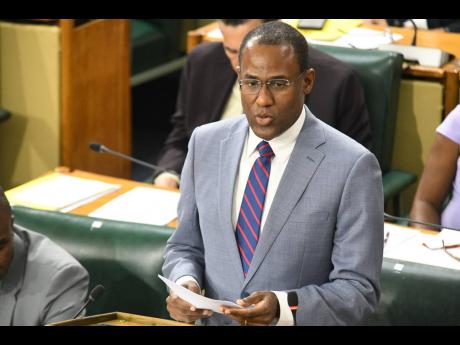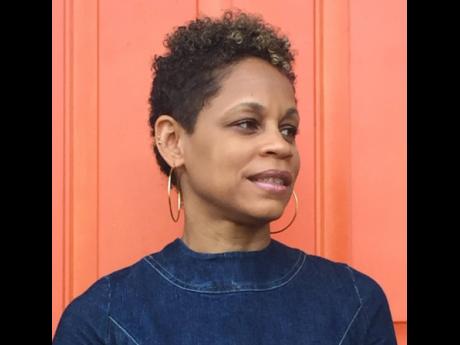Maziki Thame | The costs of Dr Clarke’s ‘success’
It is hoped that Jamaicans can separate their desire to celebrate an individual’s personal success as a Jamaican from what is good for Jamaica. We would, for instance, want to celebrate that a daughter of Jamaica, in the person of Kamala Harris, could rise to the presidency of the United States. We would applaud her success at being the first woman, at being the first woman of African descent, at being one of us. But we should not be naïve. We should not think that US foreign policy will necessarily be in the interest of people like us just because one of us sits in the presidential seat of power.
Similarly, we should be raising questions about our minister of finance’s appointment as deputy managing director at the International Monetary Fund (IMF) even if we may recognise that his personal success may mean that Jamaicans are able to push themselves to presumed higher heights than whatever they can achieve at home. The prime minister tells us that his appointment is indicative of the success of his administration. But what does success mean exactly?
If we recall the historical relationship of the IMF to countries like ours and in a global system of inequality, which produces significant poverty and very little wealth and favours the rich over the poor, we might not be so ready to applaud. We might recognise, instead, that Minister Clarke’s ascension may have come at great cost to the majority in this nation. We might recognise that the interests of the IMF are not necessarily those of Jamaica.
In addition, we might begin to question the alliances of our leadership. Caribbean thinkers like CLR James and Franz Fanon anticipated that the political class would take the side of the former coloniser once they came to power because they wanted to be the coloniser. In the case of Jamaica, politics has been controlled by a middle class unsure of its relationship with the majority of the people and often defining the people’s interest with that of the global and local wealthy.
In the neoliberal period, since the 1980s, the logic of trickle-down economics said the state should withdraw from being obligated to engender development and serve the interests of the majority and, instead, facilitate the interests of the owners of capital. Presumably, if the wealth of the owners of capital grew, so, too, would that of the people. That has not happened. The people remain poor and the wealthy are even richer.
CLASS INTERESTS
Nigel Clarke’s appointment to the IMF (he is not the first Jamaican to be so appointed) is a matter of class interests. It is about the capacity of so-called talent from the historically named Third World to be absorbed into serving the interests of the rich. We should not be so naïve as to think his role at the IMF will be to intercede on behalf of the Jamaican people.
As a lender, the IMF is most concerned with recovering the money it has loaned. As a player in the global political economy, it represents the interests of its richest members who vote in a weighted system that allows them to determine global economic policy. In the 1980s, the IMF was, along with the World Bank, the major force for imposing structural adjustment on poor countries. Structural adjustment based on neoliberal economics was said to make countries better able to pay their debt. Among the features of structural adjustment was austerity – reduced expenditure on social and public goods as a means to create surplus/fiscal space to repay debt. Essentially, it means that the needs of people were to be set to the side so that governments could repay debt. This has been the role that Nigel Clarke has played in the office of minister of finance.
Some may argue that if countries take loans, they are morally obliged to repay their debts, and that is that. But consider first the advice of Jackass: the world nuh level. All countries did not begin at the same place in the global political economy. Descendants of enslaved Africans, formerly colonised people, did not begin independence with compensation for their impoverishment and underdevelopment through slavery and colonialism. Debt was one result of inequality. But also, how countries are treated when they have debt is a matter of power. It means that the rules differ – the United States with a debt to GDP ratio of 123 per cent in 2023 - has no obligations to reach the 60 per cent ratio that Jamaica has agreed to meet. Should we be thinking about how to make the system more level, or should we be joining up as poster children of the IMF?
REWARDED FOR SUCCESS
Nigel Clarke has been rewarded for his success in reducing Jamaica’s debt to GDP ratio, fast moving towards the target of 60 per cent. Indeed, Jamaica is paying debt at a rate that surpasses most other countries in the world to achieve this target. We should interrogate this. We should ask: What does this magical 60 per cent mean objectively? Who decided that this was ‘sustainable debt’? And what exactly are the costs of meeting this objective? We should ask about the fairness of the global system that produces an unequal demand on the rich as against the poor. Jamaicans should think through the justness of meeting the demand when descendants of enslaved Africans, formerly colonised in Jamaica, are not able to meet good standards of daily nutrition needs. Clarke has overseen the reduction of Jamaica’s debt to GDP ratio at the cost of declining attention to the social needs of people. While the Government claims macro-economic success, the people claim to be suffering. While the Bank and other capitalist interests applaud Dr Clarke and Jamaica, the people see their nation in decline.
This year, with a $1,341 billion budget, $490 billion is allocated to principal and interest payments on debt. Meanwhile, the people suffer food insecurity; teachers are migrating because they cannot make life in Jamaica; the heath sector is under tremendous stress – hospitals are lacking beds, medicine and testing machines; parochial roads are like river beds; public transport is inefficient, perilous, and undignified; communities don’t have piped water’ and generally, people are in a constant state of misery, attempting to cope with daily living.
The real miracle is not Clarke’s success at reducing the debt to GDP ratio, but rather that with all the other negative national indicators, there is no social protest in Jamaica. Around the poor world in the 1980s and 1990s, people protested the impositions of the IMF on them. Today, we celebrate: a son of the soil has been appointed to defend the interests of the IMF. Some Jamaicans see that something is not quite right with this arrangement. With Clarke’s personal success, the national failure is the absence of mobilisation to determine how our tax dollars should be spent and whether such decisions should come from the International Monetary Fund or from the Jamaican people themselves.
Dr Maziki Thame is a political scientist at the University of the West Indies, Mona. Send feedback to columns@gleanerjm.com.


